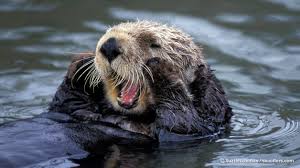
记忆方法
将“otter”与“other”组合记忆,想象一个“other”(别的)可爱的水生动物,即水獭,这样就能在心中形成一个画面,帮助记忆这个单词。
以上内容由AI生成, 仅供参考和借鉴
中文词源
otter 水獭
来自古英语otor,来自Proto-Germanic*utraz,来自PIE*udros,水生物,来自PIE*wed,水,词源同water,hydra.
英语词源
- otter
-
otter: [OE] The otter is etymologically the ‘wateranimal’. Its name goes back ultimately to an Indo-European *udros, source also of Greek húdrā ‘water-snake’ (the best-known example of which in English is the many-headed Hydra killed by Hercules). This was a derivative of the same base as produced English water. Its Germanic descendant was *otraz, which has become otter in German, Dutch, and English.
=> water - otter (n.)
- Old English otr, otor "otter," from Proto-Germanic *otraz (cognates: Old Norse otr, Swedish utter, Danish odder, Dutch otter, Old High German ottar, German Otter), from PIE *udros, literally "water-creature" (cognates: Sanskrit udrah, Avestan udra "otter;" Greek hydra "water-serpent," enydris "otter;" Latin lutra, Old Church Slavonic vydra, Lithuanian udra, Old Irish odoirne "otter"), from root *wed- (1) "water" (see water (n.1)). Sea otter attested from 1660s, also known as sea-ape.
权威例句
- 1. Since 1977 otter hunting has been illegal.
- 捕猎水獭1977年以后就被列为非法了。
- 2. Von Otter was superb both in the darkly dramatic songs, and in the lighter ones.
- 冯·奥特无论是演唱严肃的戏剧曲目还是较为轻松愉快的歌曲时,都表现得无可挑剔。
- 3. The otter , as knowing all the paths, took charge of the party.
- 水獭熟悉路径, 担任了向导.
- 4. Mrs. Otter , who did not like Clutton, pursed her lips.
- 奥特尔太太撇了撇嘴, 她不喜欢克拉顿.
- 5. On his way out Mrs. Otter asked him how he had been getting on.
- 出门时奥特太太问他情况怎么样.